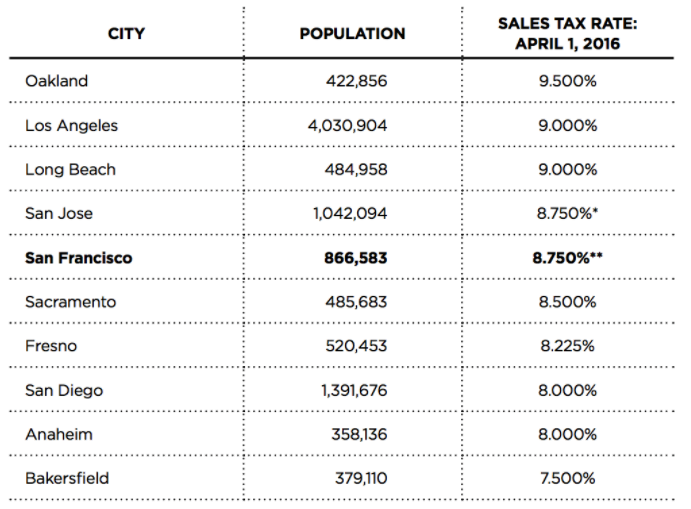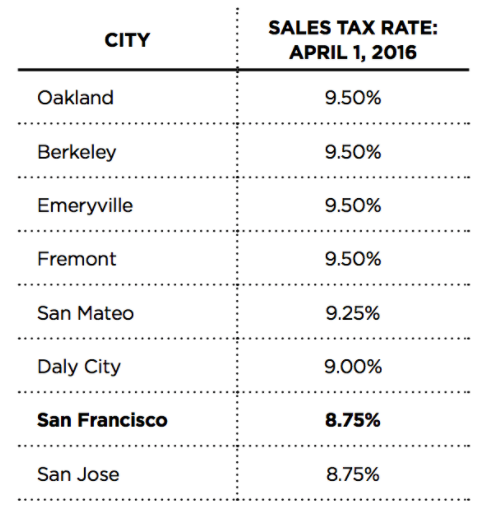What the Measure Would Do
Proposition K would increase San Francisco’s sales tax by three-quarters of a cent (0.75 percent). Because a quarter cent of the state sales tax will expire on January 1, 2017, the actual sales tax rate would change from 8.75 percent currently to 9.25 percent under this proposal. This sales tax increase would sunset after 25 years, in fiscal year 2040–41.
Currently, San Francisco’s sales tax rate falls in the middle of the range for California’s 10 largest cities:

*San Jose voters approved a quarter-cent sales tax increase in June 2016; their city’s sales tax will increase to 9 percent in October 2016. A proposed Valley Transportation Authority half-cent sales tax increase goes before South Bay voters in November 2016, which would increase San Jose’s sales tax rate to 9.5 percent.
**If Prop. K passes, San Francisco’s sales tax would increase to 9.25 percent in January 2017.
Although this proposed three-quarter-cent sales tax increase is structured as a general tax without specified uses, if Prop. J (Funding for Homelessness and Transportation) passes, it would dedicate Prop. K’s proceeds to homelessness and transportation programs. This sales tax increase is expected to raise approximately $150 million to $155 million per year. (See Prop. J for details on how the revenue would be dedicated.) If Prop. K passes but Prop. J does not, the funds raised by this measure would go into the General Fund to be allocated at the discretion of the Board of Supervisors and the mayor.
San Francisco’s tax rate is lower than most of its neighboring cities:

The Backstory
In 2013, Mayor Lee convened a Transportation 2030 Task Force to determine what San Francisco needed to do to improve its existing transportation system and prepare it for major population and employment growth between 2013 and 2030. (See the Prop. J “Backstory” section for details.) A sales tax measure to fund transportation needs was one of the task force’s recommendations.
A sales tax is a good way to raise money because it’s easy to administer, it has the potential to generate steady and significant revenue quickly, and small increases tend not to hinder consumer spending. Sales taxes can affect lower-income residents more acutely because they pay a higher share of their income on taxable retail goods like clothing and housewares. However, the regressive impact of a sales tax can be mitigated if resulting revenues are spent on services that benefit low-income populations, as this sales tax and its companion measure would.
The task force that originally proposed the sales tax recommended a halfcent increase, but due to San Francisco’s acute problem with homelessness, combined with the fact that state changes are reducing San Francisco’s effective sales tax rate by a quarter cent, policymakers decided to increase the sales tax to three-quarters of a cent to recapture that additional quarter cent and spend it on programs to address homelessness.
This measure was placed on the ballot by an 8 to 3 vote of the Board of Supervisors. Structured as a general tax, Prop. K requires a simple majority of the voters’ support (50 percent plus one vote) to pass. See Prop. J for more details on the structure of this tax measure.
Pros
-
A sales tax increase would create locally controlled funding that could be dedicated to city priorities. Because the state sales tax is partially expiring at the same time, San Francisco would only experience a half-cent tax increase but would receive three-quarters of a cent on the dollar in local funding generated.
-
The funds generated by Prop. K would be invested in critical needs: San Francisco’s transportation system and housing and services for the homeless. San Francisco’s health and quality of life depend on a well-functioning transportation system that prioritizes transit, bicycle and pedestrian travel. The money from this measure would result in improvements across those transportation modes, partially correcting decades of underinvestment and including regional transit such as BART and Caltrain.
-
This sales tax meets SPUR’s criteria for a good tax measure:1 it would raise a substantial amount of money; it would be easy to administer and understand; it would have low transaction costs; it would not cause economic flight; and it was developed through a broad and effective process.
Cons
- If voters approve all revenue-related ballot measures this election, this sales tax increase could coincide with multiple other tax and fee increases in the city. The cumulative impact of these measures could make San Francisco less affordable for residents and less attractive to businesses.